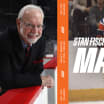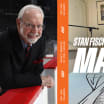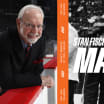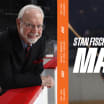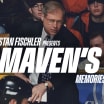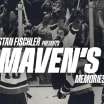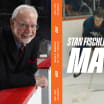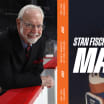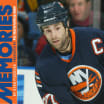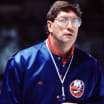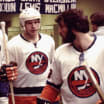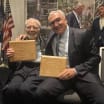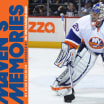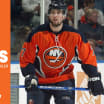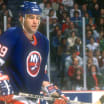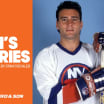Winning a Stanley Cup -- no less than four straight, as the dynastic Islanders accomplished -- requires several ingredients, some less apparent than others.
From a performance viewpoint, the most obvious include superior goaltending, dependable defense and the ability to score big goals when it counts most; alias clutch-ability.
Maven's Memories: Taming the Intimidators
The Islanders paved their road to the Stanley Cup by toppling the Big Bad Bruins and Broad St. Bullies
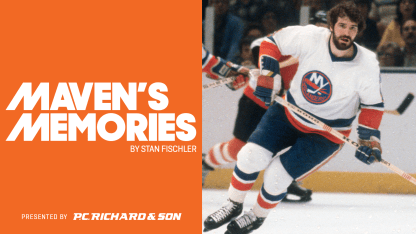
By
Stan Fischler
Special to NHL.com
Another element that often achieves notoriety was brought to the fore during the decade of the 1970's by a pair of championship teams; one in Boston and the other in Philadelphia.
The first became known as Bobby Orr and The Big, Bad Bruins. Those belligerent Beantowners won Stanley Cups in 1970 and again two years later.
Then came Bobby Clarke and The Broad Street Bullies. Philadelphia became the first expansion team to take Lord Stanley's mug; doing it first in 1974 and then 1975.
"It was pretty darn clear that if we were going to get up with the big boys," said Islanders General Manager Bill Torrey, "we'd have to figure out ways and means for handling the physical side of things."
The Islanders maiden season, 1972-73, may not have been a success points-wise, but Torrey and his chief scout, Jim Devellano, were not oblivious to the physical requirements. To beat Boston and Philadelphia the Islanders would have to tame the intimidators.
"We saw what the Flyers were doing and what their owner, Ed Snider, was telling the rest of the hockey world -- that his club wasn't going to be pushed around," said Devellano.
"They had their skill guys like Bill Barber and Rick MacLeish but they made sure they also had physical fellas such as Dave Schultz, Moose Dupont and Bob Kelly."
While Torrey patiently constructed -- and often reconstructed -- his roster, he watched the growth of young, robust forwards on his club's American League farm in New Haven.
Bob Nystrom, who soon would be promoted to the big club, was Exhibit A and pepper pot forward Garry Howatt was Exhibit B, among the forwards. The best body-belting backliner, Gerry Hart, was a product of the mining town of Flin Flon,Manitoba. That man was a skating cannon.
"Anybody who played hockey for the Flin Flon (Junior) Bombers," chuckled Devellano, had to be tough just to survive."
But of those first-year-Isles, none was more interested in be-bop than goalie William Smith, better known, far and wide, as "Battlin' Billy." Smith swiftly displayed his no-nonsense approach to the enemy in an early season 2-1 loss to the already hated Rangers.
"The most memorable moment of the game," wrote Tim Moriarty in his book, The Incredible Islanders, "came in the second period when Smith gained the dubious honor of drawing the Islanders first major penalty for fighting. His opponent was Rod Gilbert. Smitty dropped his gloves and stick and mauled the handsome Ranger."
Later in the season, "The Toughie Twins," Howatt and Nystrom were promoted from New Haven and gained instant acclaim for their vim, vigor and vitality in a game against Bobby Orr's truculent Bruins.
Moriarty: "Howatt was so audacious. He pushed Boston defenseman Dallas Smith around. He shoved Terry O'Reilly and he even took a run at Bobby Orr."
Howatt's post-game response was perfectly natural and honest. "I've got to play that way to stay here." And so he did, along with Nystrom who blackened the eye of Rangers future Hall of Fame defenseman Brad Park during an exhibition game in the fall of 1973.
That was the autumn remembered for the debut of highly-touted top Draft pick Denis Potvin who would immediately add to the Islanders intensifying physicality.
Unlike the Bullies from Broad Street and the trouble-causing Bruins from Causeway Street, the Isles -- for the most part -- were not looking for trouble. But if the troublemakers started something, they were ready.
Denis Potvin, for example, knew how to get even with devastatingly legal body checks; you could call them human torpedoes and not be off the mark. Potvin rarely was.
"I remember a game against the Rangers," remembered Denis' older brother Jean Potvin, "when Denny threw three hip checks in a row and nailed a Ranger each time. It was in the Garden and the fans were going crazy, screaming at the referee. But what was the ref going to do? Every check was legal."
Perhaps the most amazing part of the exchange was Brad Park's reaction; he commended Denis rather than condemning him.
"Denis is a tough kid and not afraid to throw his weight around," said Park.
When Al Arbour took over as coach for the club's second season, 1973-74, he encouraged a solid physical game without going overboard. A multi-Cup winner as a defenseman, Radar had learned the physical game under tough coaches such as Punch Imlach in Toronto. Players like Denis Potvin and Bob Nystrom reminded Arbour of his rugged Cup-winning Leafs teammates, defenseman Tim Horton and forward Dick Duff.
"Punch taught me a bit about how to counter intimidators like John Ferguson (of the Canadiens," said Radar, "and I learned some playing alongside Pierre Pilote and Reg Fleming when we won a Cup for Chicago in '61."
Needless to say, the Nassau Veterans' Memorial Coliseum Faithful quickly admired the tough-but-clean Isles, especially Nystrom who never would refuse a challenge.
"The fans took to my aggressive style," Nystrom remembered. "They liked the fact that I wouldn't back off."
Ny complemented his aggressive game with improved offense. Meanwhile, Torrey looked for more robust players like Bobby and found one in the Entry Draft. This behemoth of a skater would later emerge as one of the most gifted players and, eventually, a Hall of Famer.
Plucked fourth overall in 1974, left wing Clark Gillies was a broth of a boy at 6-3, 215 pounds. He had the goods too; a harsh shot, smarts and a pair of ham-like fists; just in case.
"Clark was an easy-going guy," said Nystrom. "He liked a good laugh but if anyone on the other team, got under his skin and pushed him too far; well, look out!"
Legends Plaque Series: Bob Nystrom
By this time Gillies had arrived on the NHL stage Philly forward Dave Schultz already had earned a nickname, "Hammer." He was the classic instigator-brawler and usually got the upper hand; that is, until the night of May 8, 1975,
This was Game Five of the 1975 Flyers-Isles series which the Isles would win, 5-1. With only 22 seconds left in the contest, Schultz proved unwilling to leave well enough alone. Unprovoked, he slashed both Nystrom and Jean Potvin which set Gillies' blood boiling.
"I decided," Clark explained, "that it was about time I stood up to Schultz."
Suffice to say that Gillies scored a rousing and unanimous TKO that even had Schultz's hometown reporters awed by the result. Writing in the Philadelphia Bulletin, Jack Chevalier described it as "the ultimate humiliation for any hockey policeman." Meaning, of course, Schultz.
One Islanders' historian wrote that Gillies vs. Schultz would -- in good time -- have long-range implications for the Uniondale skaters:
"It demonstrated that the team not only was improving artistically, but that it also could be aggressive and physical when required. Gillies, Nystrom and Howatt had given the team considerable respect."
But that was in 1975 and the Isles still were five years from their first Stanley Cup championship. During that interim, Torrey continued to blend skill in the forms of Bryan Trottier, Mike Bossy, Butch Goring and John Tonelli with some rugged individuals.
Torrey added the body checking of defenseman Dave (Bam Bam) Langevin and the utter fearlessness of blue-liner Gord Lane. For the first time since building the franchise, Torrey and Devellano believed that they had what amounted to an eight-cylinder roadster that could handle all difficult bumps in the playoff road.
"The biggest obstacle of all from the viewpoint of toughness," Devellano recalled, "was in the second round of 1980 against the Bruins. They had a list a mile long of hard-nosed hockey players.
"Up at the top were Terry O'Reilly and Wayne Cashman; not to mention Al Secord and Stan Jonathan. Their goalie, Gerry Cheevers, liked to throw 'em as well. We knew we'd have our hands full."
Legends Plaque Series: Clark Gillies
When all was said and done, diluting Boston's intimidation factor came down to Gillies standing up to O'Reilly in several; toe-to-toe slugfests. And in every bout, Jethroe was the clear-cut winner.
In its typically colorful style, the New York Post reported, "O'Reilly's face looked as if he had kissed the A subway express train after five fights in two games."
But that wasn't all. In Game Five, Al Secord took on Gillies and received a resounding beating for his efforts. When the final buzzer had sounded, the Islanders had won the series four games to one and had won the respect of every team in the NHL.
And when Gillies was asked to sum up the series, he paused momentarily before delivering the perfect squelch: "They woke up the sleeping giant!"
Aroused and immune from intimidation, the Islanders now were full speed ahead en route to their four consecutive Stanley Cups.
But, without the pure, athletic physicality of Clark Gillies and Company, it may never have happened!

